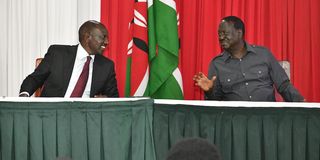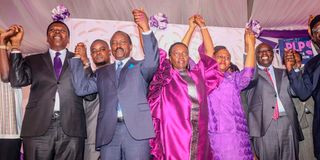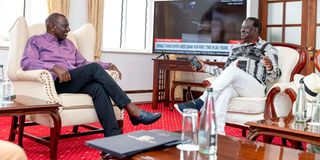
President Willam Ruto and ODM party leader Raila Odinga during the MoU signing event at KICC on March 7, 2025.
In Kenya, the political stage is a persistently dizzying carousel of intrigue and upheaval, where power shifts faster than the winds flow over the Rift Valley.
Imagine leaving the country six months ago in early October last year and returning to find a new Deputy President, Kithure Kindiki, in office without a presidential election, and President William Ruto calling his once-bitter rival Raila Odinga “my brother and prime minister”—a title dripping with both reverence and audacity.
This transformation, unthinkable just a year ago, unfolded in a whirlwind of protests, impeachments, and alliances that have turned Kenya’s political landscape into a kaleidoscope of radioactive change.
From the storming of Parliament by Gen Z protesters to the sudden thawing of a decades-long feud, the nation’s politics is a riddle wrapped in mystery, where every move defies expectation.
The roller coaster began in June 2024 when a routine budget process ignited a revolution. The proposed Finance Bill, 2024, laden with new taxes amid a punishing cost-of-living crisis, sparked fury among Kenya’s youth, who flooded the streets in a Gen Z-led uprising.

President William Ruto and opposition leader Raila Odinga sign an agreement between UDA and ODM in the presence of their party members.
Parliament became a battleground—Speaker Moses Wetang’ula fled through an underground tunnel as protesters demanded accountability. The government buckled, scrapping the Bill and the President sacked nearly the entire Cabinet. But the tremors did not stop there.
By October last year, Deputy President Rigathi Gachagua, a self-proclaimed gatekeeper of Dr Ruto’s administration, was impeached on charges of corruption and divisiveness, his fall paving the way for Prof Kindiki’s ascent.
Then, in a twist that stunned even seasoned observers, Dr Ruto and Mr Odinga signed a cooperation deal earlier this month on March 7, ushering the veteran opposition leader’s allies into government and rewriting the rules of Kenya’s power game overnight.
Yet, in this land of political alchemy, nothing is as it seems.
The Ruto-Odinga pact, hailed as a bold step towards unity, is also seen as walking a tightrope over a pit of scepticism. Mr Odinga, a towering figure who has danced at the centre of Kenya’s political drama for over 25 years, now finds his loyalties tested—cheered in some quarters, jeered in others, like in Kisii County recently where youths hurled insults at him days after the deal.
Exiled from State House
At the same time, Mr Gachagua, exiled from State House, has pivoted to embrace Mr Odinga as “our son”, a stark reversal from the traps he once laid for him.
Even First Lady Rachel Ruto, has traded prayer sessions with Mr Gachagua’s wife, Pastor Dorcas, for alliances in Mr Odinga’s strongholds — hosting the International Women’s Day in Homa Bay County with the former PM’s spouse, Ida Odinga.
Last Sunday, she shared a pew with Second Lady Joyce Kithure in Karen. In Kenya, alliances are as fluid as water, and the ground beneath every politician’s feet trembles with the promise of betrayal or redemption.
As another Finance Bill looms, Kenya braces for the next act in this unrelenting saga.
Amani National Congress (ANC) which is associated with Prime Cabinet Secretary Musalia Mudavadi has joined hands with President Ruto’s United Democratic Alliance (UDA). On the other hand, the opposition is a fractured mosaic — Ms Martha Karua has rebranded her party and Mr Gachagua is courting old foes like former President Uhuru Kenyatta.
"We held our National Delegates Conference and agreed to dissolve the ANC and join the UDA. So we will all be in UDA and that is the position," the defunct ANC Secretary-General Omboko Milemba told Nation.
The youth, emboldened by their 2024 triumph, and a reinvigorated civil society stand ready to challenge a government that teeters between reform and resistance.
“When one dog falls for another, they know it’s a game, not a fight,” said acclaimed Nigerian novelist Chinua Achebe.
Uasin Gishu Senator Jackson echoed the sentiments when he quipped: “Keep politics in the lungs, not the heart—ready to exhale and pivot at a moment’s notice.”
In this cauldron of institutionalised uncertainty, as analyst Murithi Mutiga puts it: “Kenya’s democracy thrives and stumbles, its future a blank page awaiting the next unpredictable stroke.”
“… but by any standards the current political environment is extremely fluid and dynamic. It’s impossible to predict what the future holds. This is positive on one hand because it’s the strongest democracy in the region, but on the other, the uncertainty carries costs, particularly on the economic front,” observes Mr Mutiga, the Africa Director at the International Crisis Group.
Former UK Prime Minister Harold Wilson, at a briefing for journalists at the time of enduring sterling crisis in 1964, said that a week is a long time in politics. Joseph Chamberlain, a Liberal politician is recorded in 1886 as having said: “In politics, there is no use in looking beyond the next fortnight.”
This captured how fast-paced political events are.
For observers, Dr Ruto won the 2022 elections as an outsider, albeit in government, against the system and was bound to face opposition even before he settled in.
By reaching out to Mr Odinga, the President was undoubtedly on the back foot, but fortunately for him, the opposition is yet to put its house in order.
The forces coalescing around Mr Gachagua, Wiper leader Kalonzo Musyoka, Ms Karua, Jeremiah Kioni (Jubilee Party) and the Democratic Alliance Party-Kenya chief Eugene Wamalwa, are yet to identify their leader, although they say they will support anyone from within or outside the team as long as the focus is on ensuring Dr Ruto is a one-term President.

People’s Liberation Party (PLP) leader Martha Karua (center) with opposition leaders (from left) Eugene Wamalwa (DAP-K), Kalonzo Musyoka (Wiper Party), Dorothy Semu (ACT Wazalendo party) and Former Deputy President Rigathi Gachagua during PLP's launch in Nairobi on February 27, 2025.
Busia Senator Okiya Omtatah, who has forged a career as a public interest litigant, has declared he will run for the presidency. Former Chief Justice David Maraga, who led the Supreme Court in nullifying President Kenyatta's reelection in 2017 after a successful petition by Mr Odinga, is also said to be considering making a debut run.
Repeat election
President Kenyatta and his then deputy, Dr Ruto, won the repeat election that Mr Odinga boycotted in October 2017, only for the latter to reach a deal with Mr Kenyatta in 2018 that estranged Dr Ruto—a grievance he rode on to power in 2022. Retired President Kenyatta's Jubilee Party is also fronting his former Interior minister, Fred Matiang’i, as a presidential candidate.
“We are a unique lot, let no one lie to you that they can predict the trends of our politics even for the next two weeks. In fact, expect more action-packed developments ahead of the 2027 elections. You will see more alignments and realignments,” Prof Godwin Siundu from the University of Nairobi Department of Literature holds.
The Gen Z upset is comparable to President Mwai Kibaki's defeat in the 2005 referendum on the new Constitution. On that day, the custodian of State power lost and, in a fit of rage, sacked the entire Cabinet. Dr Ruto did the same when the Gen Z protests peaked on June 25 last year — he sacked all ministers except Mr Mudavadi.
Today, Mr Gachagua would do anything to be in the good books of Mr Kenyatta and the extended Kenyatta family, the same people he built his career around in Central Kenya, castigating them as being responsible for the economic suffering of the people of the Mountain. Mr Gachagua now fondly refers to Mr Kenyatta as “our leader and king”. But the former President is yet to publicly embrace him.
In the run-up to the 2022 elections, Central Kenya was President Ruto's second home. He camped there and became the darling of the locals. The bond between him and the locals became so close that Mr Kenyatta accused him of “milking with his own Napier grass”. The region even defied Mr Kenyatta, its kingpin, to vote for Dr Ruto in the polls.
But today, the cheese has moved, and on several occasions, the President's representatives in Central have been denied a chance to read his speech. The prevailing hostility has seen Dr Ruto skip the region on his tours for several months now. They accuse him of leading the charge to impeach their son Gachagua—and worse, of embracing Odinga.

President William Ruto and former Prime Minister Raila Odinga at State House in Mombasa on February 24, 2025.
In parliament, too, the matrix has changed; it's now opposition in government. Committees traditionally chaired by the government/majority, such as health and budget, are now in the hands of Odinga's loyalists, creating a thin line between government and opposition.
The game of Musicale chairs is also playing out at the counties with deputy governor Isaac Mutuma set to be sworn in Monday as Meru governor following the impeachment of Kawira Mwangaza.
In the past year, civil society has become bolder, stepping into the void left by the opposition, and the younger generation, usually aloof from politics, has stepped forward to assert itself. The next year may be even more unpredictable.
And we are about three months away from the next budget. Will it be another crunch time, will the centre hold? Only time will tell.








